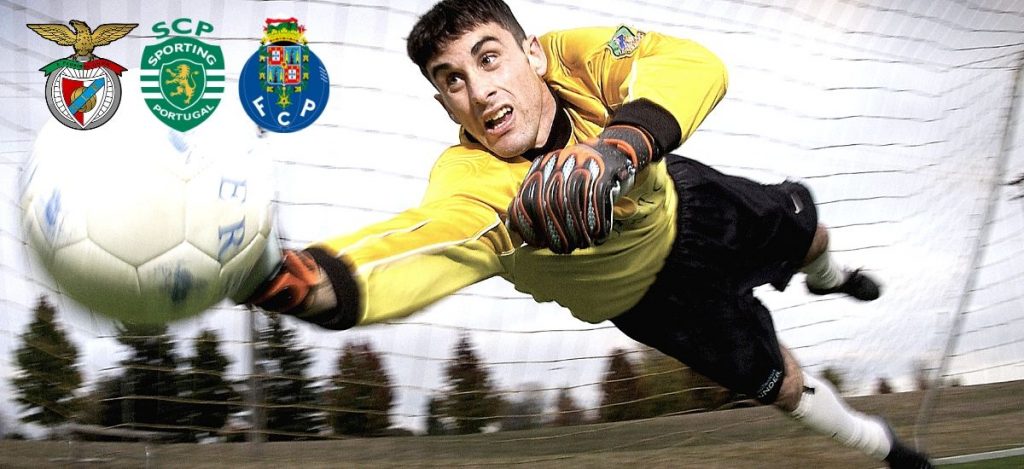Red, blue or green? Which is your favorite? I am not referring to the colors themselves, I am referring to Portuguese soccer teams. Benfica, Porto or Sporting. Which is your favorite?
For those of you that don’t follow soccer in Portugal, red is the color of Sport Lisboa e Benfica, blue for Futebol Clube do Porto, and green for Sporting Clube de Portugal.
The question “who’s your favorite team?” comes up when people (men in particular) meet for the first time. It may not come up explicitly, but in subtle ways, the affiliation is expressed. It sets the mood for the relationship and may end it before it starts.
While many other teams exist in Portugal, most people support one of these three teams. In extreme cases, some groups of fans act like violent street gangs in American cities, the factions are fiercely opposed to each other, and at times, some clashes have even led to death.
I am sick over it. I have just about had enough of the bickering and fighting, and I believe it is ruining the sport in Portugal.
Let me state up front that I am a Benfica fan. I bleed red and support my team no matter what. I get depressed when they lose, and I am ecstatic when they win. I watch almost every game I can, but I am not unique in this love for Benfica.
According to most studies, they are by far the most popular team in Portugal. UEFA conducted a study in 2014 and found that 5.8 million people in Portugal supported the team. In fact, that is the most for any club in Europe per capita.
I say club because that is what teams are in Portugal, clubs. You pay to become a “sócio” or member of the team. You do so to support them financially, and in return, you get privileges like voting for the club president, discounts on tickets and priority seating at the stadium.
Before television advertisers and “branding” became the primary revenue stream of soccer clubs in Portugal, that’s how they were funded.
Membership is not a requirement, but many do so because they feel they are contributing to the team’s success. I became Sport Lisboa e Benfica socio number 61349 in 2002.
Benfica enjoys widespread popularity for several reasons. In the glory days when soccer became a hugely popular sport in Portugal and across Europe they were an empire.
They won a string of national and international championships and had the worlds best player in Eusebio. It was suggested that they enjoyed the dictatorship’s elicit support as a way of keeping the masses appeased and promoting Portugal internationally.
Regardless they became the club with the most national championships in Portugal up until the present day. Their main rivals are Sporting and Porto.
Porto is the oldest of these and the second most decorated team in Portugal after Benfica, but they have won more international competitions including the Champions League and Europa League twice.
Porto’s main success came in the 80s, 90s, and 2000s when they won almost all the national titles mostly due to their shrewd and demanding President Jorge Nuno Pinto da Costa.
No one has impacted Portuguese soccer like Pinto da Costa. He has been the President of Porto since 1982 and has been a model to other teams in the form of how he runs the team.
Even Benfica’s current President Luis Filipe Viera has copied him although you won’t ever hear him say so. Porto is also the second most loved team in Portugal.
Sporting is third both in terms of fans and titles, but it boasts an impressive alumni list that includes Paulo Futre, Luis Figo, and Cristiano Ronaldo.
Sporting’s academy is considered one of the most elite in the world. They consistently churn out world class players from their youth development system.
In the mid-20th century, they were neck and neck with Benfica in winning titles but haven’t won one since 2002. Sporting has become the Chicago Cubs and Boston Red Sox of Portuguese soccer as of late.
They always seem to get in their way. It is as if they were cursed as a string of bad luck, poor management, and questionable fiscal practices hamper their success.
Their last President is currently charged with assault as he is the prime suspect in organizing an attack on his own players while they trained in their Alcochete Academy. It is alleged that he was upset over Sporting losing a UEFA Cup match and wanted to “send a message” to the team.
So, you have these three teams dominating the national sport all vying for lucrative advertising contracts and €40 million Euros that comes with winning the national title.
Being the Portuguese champion nets a handsome sum because that qualifies a team for the UEFA Champions League. Each European club team gets €40 million for participating in the UEFA Champions League and something like € 8 million for each victory in the competition.
The winner of the Champions League stands to make over €80 million. While Portuguese teams rarely win the competition that initial €40 million for winning the national title is a lot of money in Portugal.
While the fans care about the money, they are most interested in the prestige that comes with winning. Portuguese soccer fans identify themselves based on the team they support. It is much like gangs, and it has led to criminal activity.
In 1996, for instance, a Benfica fan launched a “very light” incendiary device at a Sporting fan killing him during the Portuguese Cup final.
Between 2006 and 2008 16 people were charged in the “Golden Whistle” scandal, including Pinto da Costa. Referees were bribed with money and prostitutes to fix games, and Porto was fined €150,000 and had six points taken away from them while Boavista Fútbol club was relegated to the second division.
Sporting and Benfica have had former presidents convicted of illicit activities including bribery, extortion, and theft. Benfica is currently facing an investigation over influencing referees by infiltrating the Portuguese judicial system to try and get “dirt” on them.
As I mentioned above, Sporting’s former President Bruno de Carvalho is accused of organizing an attack on his players after they lost a match. Porto is currently under investigation for hacking into Benfica’s email system to expose illicit activities.
The latest mortality occurred in April of 2017 when an Italian national supporter of Sporting Club Portugal was run over by a Benfica fan.
In May of that same year, Sporting Lisbon fans set fire to the stands at the Benfica Estadio da Luz as a reprisal. Team buses get pelted with rocks and bricks by rival claques (fan clubs) of rival teams as they drive to the stadium.
Violence at games has gotten so out of hand that the Portuguese government is sponsoring an advertising campaign with the hashtag #ViolênciaZero. One of the starkest commercials features a father sharing a story about his son being afraid of going to a soccer match because he was hit in the head with rocks during his first ever visit to a stadium in Portugal
The violence is even inflicted on referees when one of them makes a mistake. Aggrieved fans will publish the telephone number and address of refs that slighted their side on social media.
Porto fans even invaded the referee training camp to intimidate them so they wouldn’t “make mistakes” during Porto games. Why does this happen?
I place the blame on the executive leadership of the top three clubs. The animosity stems from the presidents of each of the clubs.
There are daily and sometimes hourly exchanges between the boards of each club on social media and television. The animosity stems from the presidents of each of the clubs. They blame each other for their bad results, accuse rivals of cheating by buying refs and seek to discredit their opponents in the international transfer market for players.
Teams sue each other over defamation, libel, and loss of income when their opponents publish something they deem outrageous.
Television stations in Portugal further fan the flames because they feature nightly soccer panel shows where celebrity supporters (former players, journalists or club spokespersons) of each of the three teams debate each other.
At times the men (its almost always men) talk over each other and in some cases physical altercations. The example set by club boards and Portuguese media has inflamed the situation to the point that it is hurting the sport.
You don’t see this level of hostility anywhere else in Europe. While intense rivalries exist between European clubs, it rarely reaches the level it does in Portugal. You certainly don’t see boards and Presidents of European clubs insult each other on TV and social media.
The reason is that it is bad for business. In today’s game, television rights, advertising deals, and overall publicity is the main revenue stream for clubs. You don’t want to tarnish your image by publicly throwing a tantrum.
You also want people to come to the stadium to see matches. You want families to come to the games because that ensures apparel purchases and future paying customers as children to grow up and in turn, bring their families to games. I wouldn’t bring my family to a game in Portugal.
Another problem facing the sport is claques. I should mention here that there are three types of fans: sócios (diehard fans who typically go to every game), regular fans (not sócios but equally steadfast in their support) and “claques” (organized fan clubs).
The first two types are generally passive, bringing their, friends, partners and wives along with them. While there is always a bad apple in the bunch, they tend not to be troublemakers. Some of the “claques” though, often tend to be agitators of violence.
The claques for Sporting and Porto, formally organized, are a sort of “official fan club” for the teams. They are incorporated legal entities with a hierarchy which includes a president and executive board.
The claques get preferential group ticket prices, sections of the home stadium dedicated to their base and VIP status for road games especially when the competitions especially international matches. Benfica’s claques are not formally organized legal entities, although they have a sort of murky leadership structure.
A current controversy has sprung up related to Benfica’s treatment of their claques. The Portuguese Football Federation and the Portuguese government want all the claques in Portugal to be formal legal entities.
Why you ask should the Federation, and the government want legal entity status for claques? In one word: CRIME. Claques are notorious for instigating violence and criminal acts. If you have a legal entity, you can prosecute it.
You can force them to buy insurance and be accountable to a legal system. Since many claque’s members hide behind masks and balaclavas, it is difficult to prosecute individuals if you can’t identify them. It is easier to prove that they are connected to a claque and therefore, pursue legal recourse against the entity or the management of the claque.
It is difficult to prosecute “Illegal” claques (those not formerly incorporated) since it is impossible to pinpoint who is in charge since minutes, bylaws and rules aren’t kept.
The claques get into all sorts of trouble. Nuno Mendes (known as Mustafa) is the leader of the Juve Leo (one of Sporting’s claques ) was arrested for drug trafficking. The “Super Dragōes” (Porto’s claque) have been investigated for match-fixing and threats against referees. The “No Name Boys” (Benfica’s “unofficial” claque) have themselves been investigated and prosecuted for violence, intimidation, and homicide.
For the sake of brevity, I am not listing all the cases of illegal activity undertaken by these groups. That would take up gigabytes of space. Simply Google “crimes de claques em Portugal” and get ready to read on forever.
It is my opinion that the leadership of Benfica, Porto, and Sporting are directly responsible for the acts of violence and crime committed by their claques because they support and subsidize them. The claques are extensions of the teams and supported with donations, cheap group rates for tickets, and legal representation.
The presidents of Porto and Sporting regularly photograph themselves with the claque leaders. Bruno de Carvalho, the former Sporting president, was himself a member of the Juve Leo and Torcida Verde claques.
Even though Benfica does not recognize their claques they nevertheless provide them with the same benefits enjoyed by their team’s rival claques. Benfica has been suspected (although never formally charged) with turning a blind eye to illegal drug sales by suspected members of their claques right in the Estadio da Luz Stadium.
The presidents and boards of the respective teams have the power to put an end to this lunacy, but they do the opposite and make the situation worse. Cutting off support for the bad claques and promoting the better ones would go a long way to improving the fan experience at games.
Instead of joining together for the common good of the game the top three clubs expend time, energy and resources fighting each other. Apart from the top three clubs, the rest of the league teams struggle to fill stadiums and pay salaries and diminishes the market for young Portuguese soccer players. Why apply yourself and train arduously if you can’t break in with one of the top three?
The spots on the top tier of Portuguese soccer for native players are limited because they can afford international players from Latin America.
Making it to the top team ensures a steady income and exposure that may lead to a more lucrative career in England, Spain, or Germany. Why put in the time to further develop your skills to play for Tondela, Santa Clara or Feirense?
You are lucky if they pay your salary on time. Second division players take part-time employment to afford the cost of living. No one comes to the games so your chances of “being discovered” greatly diminish unless you are exceptionally talented.
In other European countries breaking into a lower tier team, even in the lower divisions, is prestigious. In England, for instance, second division teams fill stadiums.
Young players have 44 teams between the Premier League and the second division League One as potential employers. Even lower divisions teams do well with attendance.
More domestic youth players enrich the potential field of players that may one day make it to the national team. Having a deep reservoir of players makes national teams more competitive and increases the chances of winning titles.
Despite all the problems in the Portuguese League, we did win the Euro Cup in 2016, but I can only imagine what we could have achieved if the nonsense ended.
I said at the beginning that I am a Benfica fan, but I am a soccer fan at heart. I just want Benfica to win the Championship this weekend, but at the end of the day, I understand that if they don’t, it is merely a game.
A game that is played by grown men who get compensated for running around on the grass for 90 minutes. Why would I “hate” our opponents? My standard of living, health, and overall well being have nothing to do with Benfica winning or losing. Sure, I get upset and moody for a few hours if they lose, but life goes on.
The 2018-2019 edition of the “Liga” is over. Benfica won the championship with a two point advantage over Porto. So at least for this edition of the “Campeonato” the reds have it. The second half of the season was one of the best competitive 5 months of soccer ever in Portugal because Porto and Benfica were neck and neck in the table with each trading positions at the top of the table several times.
However, from a sportsmanship perspective, it was horrible and featured daily accusations between the sides of rigging games, buying off referees and just plain cheating. Referees were even threatened before the last game of the season. Regardless of my team winning it all I think everyone loses in the end. The Portuguese game lost dignity, comportment, and respectability.
Benfica fans celebrated in the Marques de Pombal square but for me it was a hollow victory because. The goal shouldn’t be so narrowly focused on the current title. Winning at the expense of overall health of the game handicaps the sport both at the league level and internationally. The goal s of course is to win but to do so in a way that improves the game overall. If I were President of Benfica I would just ignore the rantings of the other teams. I would show them up on the field with quality players and winning results.
The Portuguese “brand” would benefit if teams worked together behind the scenes to promote the sport domestically and internationally. Think about what might have been if everyone was working toward the common goal. All we have to show for plethora and caliber of Portuguese soccer players over the years is one international title.
I want more from the “seleção”! I want to become the Brazil of Europe. I am tired of dying out in the quarterfinals of the World Cup.
The irony here is that all three colors (Blue, Green, and Red) are part of the Portuguese national flag. We should embrace that and still fiercely (but peacefully and with respect) support our team keeping these unifying colors in mind and work together to improve the whole.


